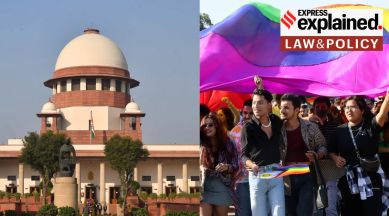Same-Sex Marriage Hearing highlights: Centre argues permitting same-sex marriage would be to the detriment of others
India Same-Sex Marriage, Supreme Court Hearing highlights: Mehta also argued that the state has a role to play in regulating personal relationships.

India Same-Sex Marriage, Supreme Court Hearing Today highlights: Continuing his arguments on legalising same-sex marriage in the Supreme Court on Thursday (April 27), Solicitor General Tushar Mehta said the court cannot give additional rights to non-heterosexual marriages that heterosexual couples do not have under the Special Marriage Act. He cited the provisions for divorce as an example.
Under the Special Marriage Act, a wife may seek divorce on the ground that her husband has, since solemnisation of the marriage, been guilty of rape, sodomy, or bestiality. Mehta said, “This is a right specifically given to the wife. In case of a gay marriage who would get this right? The petitioners argument is that the court must allow both the parties to have this right. But there is a problem there… can the court allow a right to one party in a gay marriage and not to party in a heterosexual marriage?”
monthly limit of free stories.
with an Express account.
Chief Justice of India (CJI) D Y Chandrachud, as part of a five-judge bench hearing petitions regarding legalising same-sex marriages in India, told Mehta earlier that he could not rely on the US Supreme Court’s 2022 Dobbs v Jackson case to argue judicial restraint as “in India, we have gone far beyond that.” “Dobbs represents a view of the American SC that a woman has no control over her bodily integrity. This theory has been debunked long back in our country,” he added.
Mehta cited the case, in which it was held that the Constitution does not confer a right to abortion. In doing so, the apex court overruled both Roe v Wade (1973) and Planned Parenthood v Casey (1992), which had recognised a woman’s right to make reproductive choices.